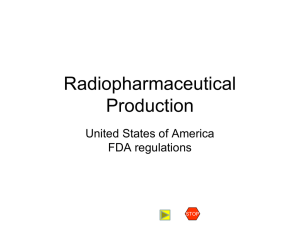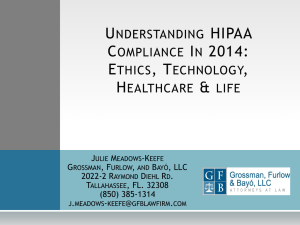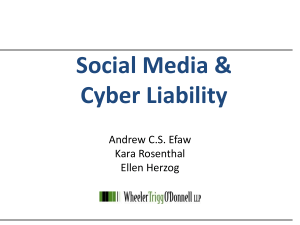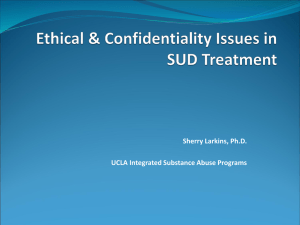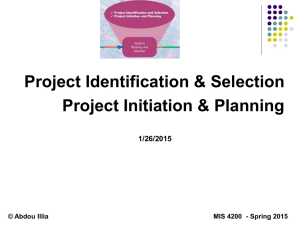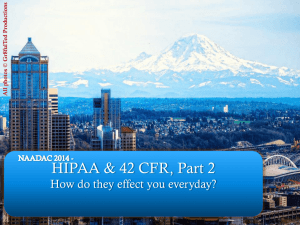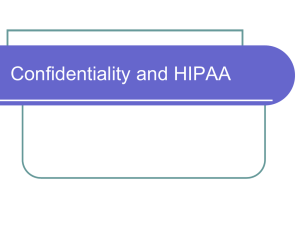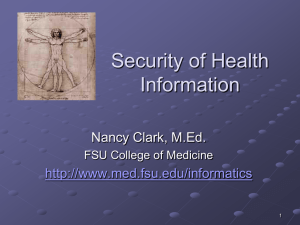The Interaction Between 42 CFR Pt 2 and HIPAA Privacy
advertisement
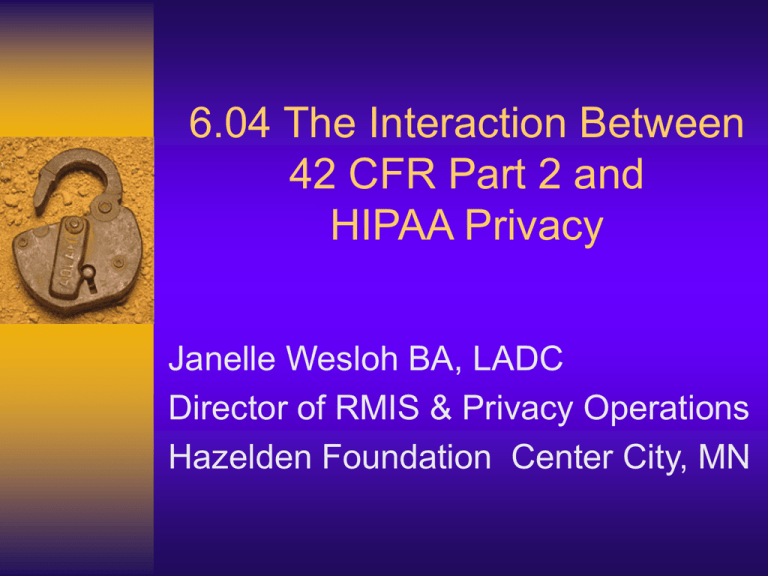
6.04 The Interaction Between 42 CFR Part 2 and HIPAA Privacy Janelle Wesloh BA, LADC Director of RMIS & Privacy Operations Hazelden Foundation Center City, MN Background… NOT a Lawyer Counseling background Electronic Medical Record Design/SA Corporate Privacy Office – Assessment/Gap Analysis – Training – Monitoring Hazelden Foundation Since 1949 3 MN Facilities – Center City, Plymouth, St. Paul Chicago, IL New York, NY Newberg, OR www.hazelden.org Hazelden Hazelden provides men, women, and teens with treatment for alcoholism and addiction. Hazelden’s programs and publications are grounded in 12 Step philosophy for lifelong recovery. Hazelden pioneered the model of care for drug addiction and alcoholism treatment that is now used around the world. 2004 Statistics Patients Served: 4,611 Publishing: Products Sold = 3,158,791 Education: – 22 Master of Arts Graduates – 5 Certificate in Addiction Counseling Graduates – 244 Professionals in Residence Research: 18 clinical research projects and papers Volunteer Support: – Over 140 volunteers donated more than 11,000 hours of service Employees: 1,020 Hazelden Center City Campus Goals Brief review of Federal Drug & Alcohol Confidentiality law Examples where the two rules do not agree Examples of how Hazelden complies with both rules Outcomes Resources Federal Drug and Alcohol Confidentiality Regulations Two laws enacted in the early 1970’s (one for alcohol, one for drugs) Guarantee strict confidentiality of information about persons receiving alcohol and drug prevention and treatment services Regulations implementing the statues were issued in 1975 Amended in 1987: Mandated abuse reporting Consolidated the statutes in 1992 (42 U.S.C 290-2), the regulations were not changed (42 CFR Part 2) Applicability Any information (including referral and intake) about alcohol and drug abuse patients obtained by a program Includes (not limited to): – Treatment or rehab programs – EAP – Programs within a general hospital – School-based programs – Private practitioners who provide alcohol or drug abuse diagnosis, treatment or referral Intent of 42 CFR Part 2 Insure that an alcohol or drug abuse patient is not made more vulnerable by reason of the availability of his or her patient record than an individual who has an alcohol or drug problem and who does not seek treatment More about 42 CFR Part 2 Regulations PROHIBIT the disclosure and use of patient records, with a few exceptions. Disclosure MAY occur if an exception exists but it does not REQUIRE the disclosure (except with a court order). 42 CFR Part 2 Allowable Disclosures Written authorization Internal Audit and evaluation Crimes (or threats of) on program communication premises or against (“need to know”) program personnel No patient-identifying Initial reports of information suspected child Medical emergency abuse or neglect Court order meeting Qualified Service specifications of 42 Organization Research More interesting 42 CFR Part 2 facts Applies even if the person seeking the information already has it or has other ways to obtain it Applies to law enforcement or other official, even with a subpoena Disclosing even the presence of a patient at a facility or unit which is identified as a place where only drug/alcohol services are provided requires written authorization Of Interest The memories and impressions of program staff are considered “records” protected by the regulations even if they are never recorded in any form. A payer or funding source that maintains records of a recipient of drug/alcohol treatment becomes subject to 42 CFR Part 2 to the same extent as the program from which the information came. The Challenge Hazelden is covered by two federal laws and six states’ laws. Some differences Some inconsistencies Need to understand both – How they interact – How to comply Which “wins”? Generally, the more recently enacted, HOWEVER: Not if earlier law has a more narrow, precise, or specific subject Not if later law addresses an issue on which an earlier law was silent Continued… Many HIPAA provisions PERMIT something but don’t mandate it. 42 CFR Part 2 PROHIBITS all disclosures unless specifically allowed by the regulation. Examples of “rule conflict” Disclosure for Payment HIPAA PERMITS disclosure with out patient consent for the purpose of payments. 42 CFR Part 2 PROHIBITS these disclosures with out patient consent. CD providers must follow 42 CFR Part 2. Patient Rights & Administrative Requirements HIPAA imposes several new administrative requirements and establishes new patient rights. These are not included in 42 CFR Part 2. CD providers must follow HIPAA. Personal Representatives HIPAA permits a “personal representative” (e.g. power of attorney) to sign consent forms on behalf of the patient. 42 CFR Part 2 limits those who may act in the place of the patient to individuals who have been legally appointed the patients’ guardian. CD providers must follow 42 CFR Part 2. Re-disclosure of Information HIPAA is silent on this topic. 42 CFR Part 2 requires that a statement prohibiting re-disclosure accompanies the patient information that is disclosed. CD providers must follow 42 CFR Part 2. Disclosures to Other Providers HIPAA allows, but does not require, programs to make disclosures to other healthcare providers without authorization. 42 CFR Part 2 limits this to medical emergencies. CD providers must follow 42 CFR Part 2. Medical Emergencies HIPAA allows health care providers to inform family members of the individual’s location and condition without consent in emergency circumstances or if a person is incapacitated. 42 CFR Part 2 limits this disclosure to medical personnel ONLY. CD providers must follow 42 CFR Part 2. Disclosure to Public Health HIPAA permits disclosure to a public health authority for disease prevention or control, or to a person who may have been exposed to or at risk of spreading a disease or condition. 42 CFR Part 2 prohibits these disclosures unless there is an authorization, court order, or the disclosure is done with out revealing patient information. CD providers must follow 42 CFR Part 2. Court Orders HIPAA makes no mention of any standards or procedures that a court must follow when issuing a court order. 42 CFR Part 2 has specific requirements. CD providers must follow 42 CFR Part 2. Disclosure of Abuse HIPAA permits disclosure about any individual believed to be a victim of abuse, neglect or domestic violence. 42 CFR Part 2 limits the exception to initial reports of child abuse or neglect (no other kinds of abuse or neglect). CD providers must follow 42 CFR Part 2, but if a state law compels to report other abuse: Obtain authorization Anonymous reporting QSO/BA with state agency Court order Right to Access Records HIPAA REQUIRES a covered program to give an individual access to his/her own health information (with few exceptions). 42 CFR Part 2 gives programs DISCRETION to decide whether to permit patients to view or obtain copies of their records, unless they are governed by a state law that gives right to access. CD providers must follow HIPAA. Privacy Notice HIPAA requires the Privacy Notice to be given at the time of first service. 42 CFR Part 2 requires the notice must be given at admission or as soon as a patient is capable of rational communication. CD providers must follow HIPAA. Minimum Necessary Under HIPAA, the standard of “Minimum Necessary” does not apply to uses or disclosures: – to or by a health care provider for treatment – made pursuant to a consent – made to HHS for compliance and enforcement – required by law – Or required for compliance with the regulations HOWEVER… 42 CFR Part 2 overrides these permissible exceptions to “Minimum Necessary”. CD providers must limit ALL DISCLOSURES to that information which is necessary to carry out the purpose of the disclosure (except to the patient him/herself). Integrating HIPAA and 42 CFR Part 2 Action Steps Conducted risk assessment and gap analysis Determined Privacy Officer and privacy structure Determined which Hazelden services are covered by which law Combined the Privacy Notices and added acknowledgment Combined the QSOA and BA Formulated written policies and formalized procedures around patient rights and administrative requirements. Set up a Privacy Board for research Action Steps, Cont… Set up training for “workforce” Set up complaint system Formulated a formal sanction policy Added a system to track and document disclosures needed for Accounting of Disclosures Changed Authorizations: format and giving copies Developed a process for written revocation of authorizations Developed auditing system Menu of Privacy & Confidentiality Policy & Procedures Example of On-line Privacy & Confidentiality Policy Example of On-line Privacy & Confidentiality Form Program/Service Classification Grid Section of Authorization to Disclose Information Outcomes Increased protection of patients privacy and confidentiality Compliance with HIPAA Strengthened compliance with 42 CFR Part 2 Lower risk for organization Streamlined, cohesive privacy and confidentiality policies on the intranet Structure to support operational needs and questions around both rules Accountability and awareness Standardized training and tools Resources To order “Confidentiality and Communication: A Guide to the Federal Drug & Alcohol Confidentiality Law and HIPAA” by The Legal Action Center: http://www.lac.org/Merchant2/merchant.mvc?Scr een=CTGY&Category_Code=P 42 CFR Part 2 Regulation http://cfr.law.cornell.edu/cfr/cfr.php?title=42&type =part&value=2 HIPAA and 42 CFR Part 2 Crosswalk http://www.tcada.state.tx.us/HIPAA/Crosswalk.pd f jwesloh@hazelden.org
